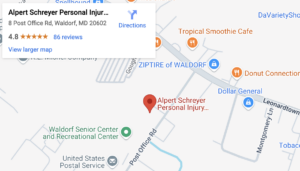
When you’re injured in an accident, one of the first people you’ll hear from isn’t your doctor or even your lawyer; it’s the insurance adjuster. Whether the claim involves a car accident, slip and fall, or another personal injury case, the insurance adjuster plays a critical role in determining how much (if anything) you’ll be paid.
But while adjusters may sound friendly and helpful on the phone, it’s important to understand their true role: to protect the insurance company’s bottom line, not yours. Knowing what to expect can help you avoid costly mistakes that could reduce your settlement.
This guide will explain everything you need to know about insurance adjusters and how to protect your rights after an accident in Maryland.
What Is an Insurance Adjuster?

An insurance adjuster—sometimes called a claims adjuster—is an employee or contractor hired by the insurance company to investigate claims.
Their main job is to:
- Review accident reports, medical records, and evidence.
- Interview witnesses and sometimes even you, the claimant.
- Estimate the cost of damages, including medical bills, lost wages, and property damage.
- Negotiate settlements on behalf of the insurance company.
While they may seem like neutral fact-finders, adjusters are loyal to the insurance company, not the injured victim. Their goal is to close claims quickly and for as little money as possible.
Different Types of Insurance Adjusters
Not all insurance adjusters are the same.
Here are the main types you might encounter:
- Company Adjusters (Staff Adjusters) – Full-time employees of the insurance company who handle claims daily.
- Independent Adjusters – Hired by the insurer on a contract basis, usually when claims involve specialized expertise or occur outside the company’s normal area.
- Public Adjusters – Hired by policyholders to represent their interests in disputes (these are more common in property damage cases than personal injury).
In personal injury claims, you’ll most often deal with company adjusters or independent adjusters, both of whom answer to the insurer—not you.
The Adjuster’s Tactics: What Accident Victims Should Watch For
Insurance adjusters are trained negotiators. They often use strategies designed to reduce the value of your claim.
Some common tactics include:
- Requesting a Recorded Statement – Adjusters may ask you to “tell your side of the story” on tape. In reality, they’re looking for inconsistencies or admissions that could be used against you later.
- Downplaying Injuries – They may suggest your injuries aren’t serious or imply that your medical treatment isn’t necessary.
- Quick Settlement Offers – Offering fast cash soon after the accident may seem tempting, but these offers are usually far lower than what your case is truly worth.
- Delaying the Process – Hoping you’ll become frustrated and accept a lower payout.
- Blaming the Victim – Suggesting you were partially or fully at fault for the accident to reduce or deny your claim.
Remember: adjusters are not on your side, no matter how polite or understanding they sound.
What You Should (and Should Not) Say to an Insurance Adjuster
If you speak to an insurance adjuster after your accident, keep these tips in mind:
Do:
- Provide only basic information (name, address, contact info).
- Confirm details like the date, time, and location of the accident.
- Stay calm and polite.
- Direct them to speak with your attorney for anything beyond basic facts.
Do Not:
- Provide a recorded statement without legal advice.
- Guess or speculate about what happened.
- Discuss your injuries in detail before you’ve completed medical treatment.
- Accept the first settlement offer without review.
The safest option is to let your lawyer handle communications with the adjuster.
How Insurance Adjusters Calculate Settlement Offers
Adjusters don’t simply add up your bills and cut a check. They use formulas and software to estimate the “value” of your claim.
Factors include:
- Medical Expenses – Hospital bills, surgeries, rehab, prescriptions, therapy.
- Lost Wages – Income lost due to time away from work.
- Property Damage – Vehicle repairs or replacement costs.
- Pain and Suffering – Adjusters often use multipliers based on medical bills, but they usually underestimate this part of your damages.
Keep in mind: their calculations are designed to favor the insurer, not to fully compensate you.
Why You Shouldn’t Trust the Adjuster’s “Final Offer”
Many accident victims believe that once the adjuster makes an offer, it’s the best they can do. This is rarely true. In fact, insurance companies often set aside much more money than they initially offer to settle claims. They count on unrepresented victims accepting less.
An experienced personal injury lawyer can review the offer, gather stronger evidence, and negotiate for a much larger settlement.
How a Lawyer Levels the Playing Field
Lawyers know how adjusters work and don’t let them take advantage of their clients.
Here’s how they help:
- Handling All Communications – Lawyers deal directly with the adjuster so you don’t have to.
- Building Strong Evidence – Medical records, expert testimony, and accident reconstructions will all be considered.
- Negotiating for Full Value – Your lawyer will push for compensation that covers both economic and non-economic damages.
- Taking Cases to Trial if Needed – If the insurance company won’t play fair, your lawyer will be prepared to present your case in court.
By leveling the playing field, your lawyer makes sure the insurance company treats your claim fairly and that you have the best chance at full compensation.
Contact Alpert Schreyer Personal Injury Lawyers for a Free Consultation
Insurance adjusters may act friendly, but their true job is to save the insurance company money—often at your expense. Talking to them without legal guidance can lead to reduced compensation or even a denied claim.
At Alpert Schreyer Personal Injury Lawyers, we know how to stand up to insurance companies and fight for what accident victims in Maryland truly deserve. If you or a loved one has been injured, don’t face the adjuster alone.
If you’ve been contacted by an insurance adjuster after an accident, call us today at (301) 932-9997. We offer free consultations and will review your case, explain your rights, and take on the insurance company for you.


